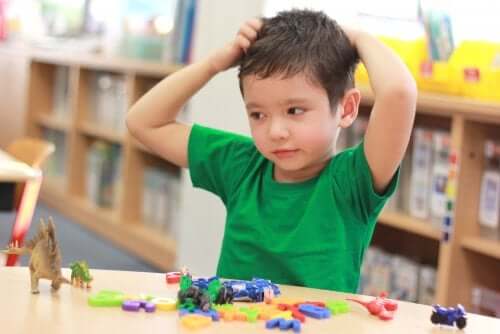Advice on Teaching Children Humility

Raising children doesn’t only involve providing them food, security, and affection. As a parent, it’s also your responsibility to convey and teach them important values. Thus, teaching children humility will allow them to live a happier life and have better social relationships.
On the contrary, presumptuous and arrogant people expend their energy on feeling and looking like everyone else. This is incompatible with a harmonious existence. Also, it generally tends to push everyone away from you. In contrast, people love being around a humble person. Humble people are tolerant, compassionate, and able to learn from their mistakes.
Therefore, if you want your child to belong to the second group, teaching them humility from a very young age is crucial. The values that you instill in your children during childhood often stay with them for their entire lives. Thus, teaching humility is an important gift.
What’s humility?
To instill this wonderful and necessary value in your children, you must fully understand what it is. Humility is a human virtue that consists of being able to recognize one’s limitations. Therefore, it consists of understanding that you’re not above anyone else.

Certain behaviors show humility in a person.
- A humble person knows their own limits and adopts an attitude of lifelong learning.
- They understand that we’re all human and that, therefore, we all make mistakes. Because of this, they never underestimate anyone nor boast of their accomplishments.
- They treat every living thing with dignity and respect.
- Finally, they’re able to ask for help when they need it and apologize when they do something wrong.
How to explain humility to children
Children don’t yet have the cognitive development to understand such an abstract complex from its definition. Therefore, the best thing you can do is incorporate it into your daily life. Thus, it’ll be easier for children to internalize this value by observing specific behaviors.
Teaching children humility through everyday examples
- Failing an exam or not making a team are moments that make a child aware of their limitations. You have to help them understand that nobody is perfect, that all humans aren’t good at the same things, and that they can work hard to improve. Thus, they shouldn’t focus on outdoing their peers but on outdoing themselves.
- When things happen the other way around, you need to help your child be compassionate with those who didn’t get good results. If they win a soccer game, show them that it isn’t appropriate to make fun of the other team. Instead, tell them it’s important to have a friendly attitude.
- If they know children from other countries, children with functional diversities, or children with other peculiarities, take advantage of that to teach your children tolerance and diversity. Don’t waste the opportunity to convey that all human beings deserve to be treated with respect and dignity and that no one is above anyone else.

- In addition, you can take your children to a park or nature so that they can appreciate and develop respect for all living beings. Teach them to keep natural spaces clean and to care for life in all its forms, from flowers to insects or elephants. Their lives are equally valuable.
- Teaching children humility consists of setting an example by recognizing your own mistakes and apologizing for them. By doing this, they’ll consider these actions normal and will incorporate them into their behavior repertoire. In the same way, remind them that asking for help is appropriate and beneficial.
Why teaching children humility is important
In contrast to what many think, humility isn’t synonymous with submission or weakness. A humble child is able to appreciate their strengths without bragging about them and recognizing their limitations without feeling inferior. In other words, they’re able to respect others without neglecting to respect themselves.
A humble child will be a happy child who won’t need to be perfect to know they’re valuable. Therefore, they won’t expect others to be perfect. In addition, they’ll know how to tolerate frustration, adapt to changes, and take advantage of adversity to learn.
Also, they’ll build healthy and sincere social relationships and, above all, they’ll have a healthy relationship with themselves, loving and accepting themselves as they are.
Raising children doesn’t only involve providing them food, security, and affection. As a parent, it’s also your responsibility to convey and teach them important values. Thus, teaching children humility will allow them to live a happier life and have better social relationships.
On the contrary, presumptuous and arrogant people expend their energy on feeling and looking like everyone else. This is incompatible with a harmonious existence. Also, it generally tends to push everyone away from you. In contrast, people love being around a humble person. Humble people are tolerant, compassionate, and able to learn from their mistakes.
Therefore, if you want your child to belong to the second group, teaching them humility from a very young age is crucial. The values that you instill in your children during childhood often stay with them for their entire lives. Thus, teaching humility is an important gift.
What’s humility?
To instill this wonderful and necessary value in your children, you must fully understand what it is. Humility is a human virtue that consists of being able to recognize one’s limitations. Therefore, it consists of understanding that you’re not above anyone else.

Certain behaviors show humility in a person.
- A humble person knows their own limits and adopts an attitude of lifelong learning.
- They understand that we’re all human and that, therefore, we all make mistakes. Because of this, they never underestimate anyone nor boast of their accomplishments.
- They treat every living thing with dignity and respect.
- Finally, they’re able to ask for help when they need it and apologize when they do something wrong.
How to explain humility to children
Children don’t yet have the cognitive development to understand such an abstract complex from its definition. Therefore, the best thing you can do is incorporate it into your daily life. Thus, it’ll be easier for children to internalize this value by observing specific behaviors.
Teaching children humility through everyday examples
- Failing an exam or not making a team are moments that make a child aware of their limitations. You have to help them understand that nobody is perfect, that all humans aren’t good at the same things, and that they can work hard to improve. Thus, they shouldn’t focus on outdoing their peers but on outdoing themselves.
- When things happen the other way around, you need to help your child be compassionate with those who didn’t get good results. If they win a soccer game, show them that it isn’t appropriate to make fun of the other team. Instead, tell them it’s important to have a friendly attitude.
- If they know children from other countries, children with functional diversities, or children with other peculiarities, take advantage of that to teach your children tolerance and diversity. Don’t waste the opportunity to convey that all human beings deserve to be treated with respect and dignity and that no one is above anyone else.

- In addition, you can take your children to a park or nature so that they can appreciate and develop respect for all living beings. Teach them to keep natural spaces clean and to care for life in all its forms, from flowers to insects or elephants. Their lives are equally valuable.
- Teaching children humility consists of setting an example by recognizing your own mistakes and apologizing for them. By doing this, they’ll consider these actions normal and will incorporate them into their behavior repertoire. In the same way, remind them that asking for help is appropriate and beneficial.
Why teaching children humility is important
In contrast to what many think, humility isn’t synonymous with submission or weakness. A humble child is able to appreciate their strengths without bragging about them and recognizing their limitations without feeling inferior. In other words, they’re able to respect others without neglecting to respect themselves.
A humble child will be a happy child who won’t need to be perfect to know they’re valuable. Therefore, they won’t expect others to be perfect. In addition, they’ll know how to tolerate frustration, adapt to changes, and take advantage of adversity to learn.
Also, they’ll build healthy and sincere social relationships and, above all, they’ll have a healthy relationship with themselves, loving and accepting themselves as they are.
All cited sources were thoroughly reviewed by our team to ensure their quality, reliability, currency, and validity. The bibliography of this article was considered reliable and of academic or scientific accuracy.
- Romañach, J., & Lobato, M. (2005). Diversidad funcional, nuevo término para la lucha por la dignidad en la diversidad del ser humano. Foro de vida independiente, 5, 1-8.
- Sabater, V. (2019b, 6 junio). El poder de la humildad. Recuperado 5 noviembre, 2019, de https://lamenteesmaravillosa.com/el-poder-de-la-humildad/
This text is provided for informational purposes only and does not replace consultation with a professional. If in doubt, consult your specialist.








